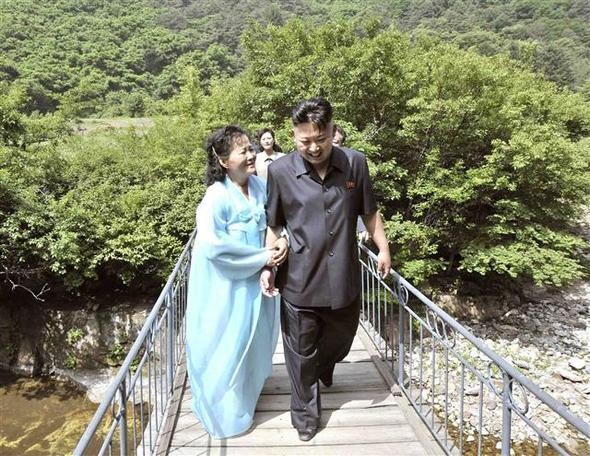hankyoreh
Links to other country sites 다른 나라 사이트 링크
N. Korea alters definition of “denuclearization”

By Gil Yun-hyung, staff reporter
The statement issued on June 16 by a spokesperson for North Korea’s National Defense Commission is drawing attention for its redefinition of “denuclearization.”
In the statement, denuclearization of the Korean Peninsula was characterized as having the goal of “applying to the entire peninsula, including South Choson [Korea], and completely ending the US nuclear threat” rather than being “merely for the sake of ending the North Korean nuclear program.”
With its message, Pyongyang stressed that future denuclearization efforts should be aimed at removing not only its own nuclear weapons but the US’s as well.
North Korea has often said a removal of the US nuclear threat should accompany its own denuclearization efforts. The Joint Statement of September 19, 2005, which the US regards as a starting point for resuming the six-party talks on North Korea’s nuclear program, defines the goal of those talks as North Korea’s commitment to “abandoning all nuclear weapons and existing nuclear programs,” but also includes mention of the US affirming “that it has no nuclear weapons on the Korean Peninsula and has no intention to attack or invade” North Korea.
Similar calls were found in “The Choson [Korean] Peninsula and Nuclear Weapons,” a foreign ministry memo from April 21, 2010, that explained the details of North Korea‘s nuclear policy for the outside world. In it, the ministry said the “mission of nuclear weapons” would continue “until the denuclearization of the Choson Peninsula and the world has been achieved.” It also stated principles of not using nuclear weapons against non-nuclear powers and participating in efforts toward non-proliferation.
A foreign ministry statement from January 23 said, “Even if there is dialogue to ensure peace on the Choson Peninsula, there will not be dialogue about denuclearizing the Choson Peninsula.”
Based on the previous statements, experts are reading the latest as a “fine-tuning” of Pyongyang’s line prior to any direct dialogue with Washington. It may also have the aim of squaring the latest dialogue offers with its 2012 constitutional amendment declaring North Korea to be a nuclear power and a late March announcement of policies aimed at “building nuclear power and the economy together.”
Choi Jong-kun, a professor of international security at Yonsei University, said Washington’s zero-tolerance position on North Korea’s nuclear program made it unlikely to accept Pyongyang’s position.
“North Korea’s new definition of denuclearization is presented in some sense as an arms reduction negotiation between two equal nuclear powers,” Choi said.
“If the US does respond, it is very likely to start very slowly working on one issue at a time at a very low level,” he added.
Please direct questions or comments to [english@hani.co.kr]

Editorial・opinion
![[Column] Park Geun-hye déjà vu in Yoon Suk-yeol [Column] Park Geun-hye déjà vu in Yoon Suk-yeol](https://flexible.img.hani.co.kr/flexible/normal/500/300/imgdb/original/2024/0424/651713945113788.jpg) [Column] Park Geun-hye déjà vu in Yoon Suk-yeol
[Column] Park Geun-hye déjà vu in Yoon Suk-yeol![[Editorial] New weight of N. Korea’s nuclear threats makes dialogue all the more urgent [Editorial] New weight of N. Korea’s nuclear threats makes dialogue all the more urgent](https://flexible.img.hani.co.kr/flexible/normal/500/300/imgdb/original/2024/0424/7317139454662664.jpg) [Editorial] New weight of N. Korea’s nuclear threats makes dialogue all the more urgent
[Editorial] New weight of N. Korea’s nuclear threats makes dialogue all the more urgent- [Guest essay] The real reason Korea’s new right wants to dub Rhee a founding father
- [Column] ‘Choson’: Is it time we start referring to N. Korea in its own terms?
- [Editorial] Japan’s rewriting of history with Korea has gone too far
- [Column] The president’s questionable capacity for dialogue
- [Column] Are chaebol firms just pizza pies for families to divvy up as they please?
- [Column] Has Korea, too, crossed the Rubicon on China?
- [Correspondent’s column] In Japan’s alliance with US, echoes of its past alliances with UK
- [Editorial] Does Yoon think the Korean public is wrong?
Most viewed articles
- 1‘We must say no’: Seoul defense chief on Korean, USFK involvement in hypothetical Taiwan crisis
- 2N. Korean delegation’s trip to Iran shows how Pyongyang is leveraging ties with Moscow
- 3‘Weddingflation’ breaks the bank for Korean couples-to-be
- 4[Reportage] On US campuses, student risk arrest as they call for divestment from Israel
- 5Amnesty notes ‘erosion’ of freedom of expression in Korea in annual human rights report
- 6[Column] Park Geun-hye déjà vu in Yoon Suk-yeol
- 7Korea sees more deaths than births for 52nd consecutive month in February
- 8[Editorial] New weight of N. Korea’s nuclear threats makes dialogue all the more urgent
- 9Will NewJeans end up collateral damage in internal feud at K-pop juggernaut Hybe?
- 10[Guest essay] The real reason Korea’s new right wants to dub Rhee a founding father